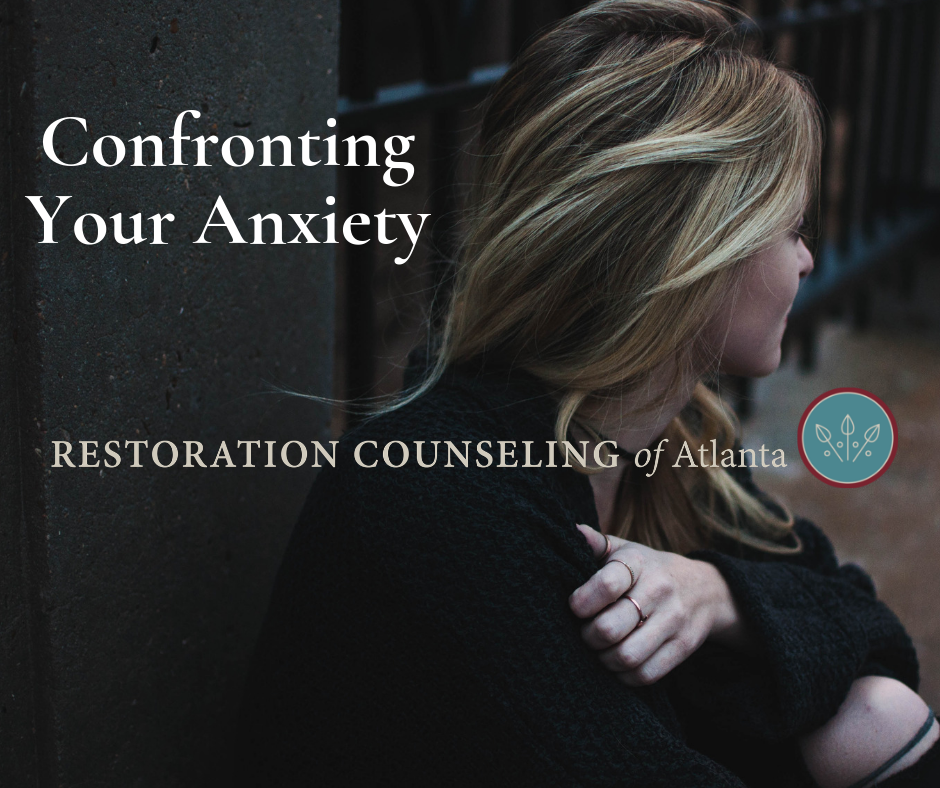What Does Anxiety Look Like?
Anxiety disorders are the most common form of mental illness in America; however, they often go undiagnosed and untreated because many people are unaware that they struggle with anxiety. Others fear shame or rejection if they acknowledge their anxiety and may fear that talking about their struggles might make it worse so they typically suffer in silence. Anxiety can actually serve as a protective barrier from one’s feelings. Someone who likes to be extremely busy for example might try distracting themselves from feeling. Distraction might help in the short term, but it will only further the feelings of anxiety and can actually make one feel more anxious in the future.
Painful emotions such as sadness and fear can feel scary to process. An anxious person might run from these difficult feelings thinking that if they pause long enough they will have to feel the painful emotions. All the while, this person has no idea how much constant mental and emotional effort they are using to make themselves not feel these difficult emotions.
Emotions are indicators of what is going on deep inside of a person and they are neither good nor bad. They are similar to when a fuel light comes on in a car to alert the driver to get gas. Without a fuel indicator on a car, the driver would run out of gas. Emotions are the same way, and ignoring them is like driving a car on an empty gas tank. These negative emotions will find a way out somehow and eventually catch up to the person. Someone does not just suddenly explode with anger for no reason; he or she has most likely pushed down feelings that are bothering them.
God’s View
Christians often say to each other “it is a sin to be anxious and don’t be anxious.” That message only makes someone feel guilty about feeling anxious so it adds another layer of guilt to the anxiety someone is already feeling. God does not want us to be anxious, and yet He also empathizes with us that we are human and are going to worry. He wants us to trust Him and He also knows that we will feel anxious at times. Someone who is feeling anxious does not want someone to tell them they shouldn’t feel anxious. Instead, they would prefer someone to come alongside them and say “what do you think is making you feel anxious?”
Meeting others in their anxiety with love and grace will help them feel more comfortable being vulnerable about their fears. Exploring anxiety with compassion and curiosity can provide such an antidote to shame and fear about feeling anxious. Exploring one’s emotions with curiosity is a much healthier way of processing feelings rather than telling someone they should not feel a certain way. Don’t we all want someone who we can be completely honest and real about our feelings? Don’t we all want someone that will tell us it’s normal and valid for us to feel the way we do? Anxiety can be turned into something powerful when someone chooses to use it as a call to prayer.
Have you wondered if you struggle with generalized anxiety disorder but have been too scared to be honest with yourself that it might be a struggle for you?
Here are some questions to ask yourself to see if you might struggle with anxiety:
- Do you often ruminate or get stuck on the same negative thoughts?
- Are you replaying conversations over and over again in your mind while blaming yourself for saying the wrong thing in conversations?
- Do you struggle with making decisions?
- Are you finding yourself often thinking of the worst case scenario happening?
- Is it challenging for you to control your worry?
- Do the anxiety or worry symptoms cause significant distress and impair daily functioning?
If you have experienced three of the following symptoms for the majority of the past few weeks, then you might have a generalized anxiety disorder and professional counseling could be very beneficial.
Symptoms
These symptoms include but are not limited to restlessness, excessive fatigue, trouble paying attention, irritability, difficulty sleeping and muscle tension. It is also important to note that only one of the symptoms is required in children for them to have anxiety. Anxiety often manifests in children as irritability and frustration.
Medication can also be hugely successful if anxiety is interfering with someone’s ability to function in daily life. Anxiety has a genetic component to it as well. If someone in your family takes anxiety medication and benefits from it, then medication might also work for you. Starting a new medication for anxiety can be challenging because sometimes the symptoms get worse before they get better. Some psychiatrists are now able to test a person’s DNA to see which three anxiety medications would work best for that person based on their genetic makeup. This new knowledge can help make the process of starting and finding the right medication much quicker and easier.
Coping Skills to Help Alleviate Anxiety
Here are just a few things that can help someone with anxiety: self-awareness, exercise, and community. Self-awareness is absolutely vital to helping someone understand his or her anxiety. The more awareness that someone has about their anxiety, the better that he or she will be able to receive help. Anxiety often takes place when someone does not know what he or she feels. Awareness of thoughts and feelings will help one to be less anxious. Research on neuroscience explains that the brain is changeable. We learn behavior, so we can also unlearn it. Since anxiety is a learned behavior then choosing rest and pace can also become a learned behavior as well.
Exercise provides the healthy stress-relieving endorphins one needs to fight off anxiety. Get creative with exercise. Park the car at the other end of the parking lot to walk a few extra steps, do fifteen jumping jacks every other hour at work, take the stairs at work instead of the elevator, do calf-raises while sitting at your desk. Exercise helps the brain to avoid getting stuck on negative thoughts. It creates new neurons and new pathways in the brain.
Other Tips
If you struggle with anxiety, stop and examine your thoughts. All negative feelings can be traced back to negative thoughts. If you are reflecting on negative thoughts, then you are most likely experiencing negative feelings. Try doing a gratitude journal to focus your thoughts on more positive ones. Explore the anxiety with curiosity. Change your relationship with the anxiety and ask yourself “what do I need right now?”
Community is also very important to lessening anxiety. It’s vital to have community support so that one does not feel alone. Feeling alone only increases these feelings. Shame and anxiety breed in isolation. Be vulnerable and real about your anxiety and tell others about it. You are not alone. Every person has felt anxious at some point in their lives and being the first one to be vulnerable about it could really benefit the person next to you.
There are many myths about anxiety and what it appears to be. If you are concerned at all that you might struggle with anxiety, it would be beneficial for you to attend counseling to help you gain a greater awareness of what can be helpful to you. Being willing to talk about it will help it to be less scary and less shameful. You can experience freedom from anxiety.
 Written by: Mead Reed, MA, LPC, LAMFT
Written by: Mead Reed, MA, LPC, LAMFT
mead@restorationcounselingatl.com, ext. 115
Roswell and Woodstock Locations
Mead counsels children, adolescents, adults, and families who are struggling with anxiety, depression, communication difficulties, grief, as well as other life issues. She is a certified PREPARE/ENRICH facilitator and also works with premarital couples. She is trained in sand tray therapy which is beneficial for working with children and individuals. Mead’s sincere desire to help her clients experience freedom from fear. She is passionate about helping her clients to get out of the rut that they have been experiencing and into new, healthy, relationship patterns. She will provide a safe environment for healing.

